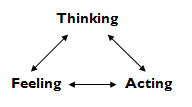 In previous posts we looked at what happens when we try to problem solve or control our emotions, neither of which tend to work. When we’ve giving up on trying to problem solve or control our emotions, our next step is often to try to suppress our emotions, or ignore them completely.
In previous posts we looked at what happens when we try to problem solve or control our emotions, neither of which tend to work. When we’ve giving up on trying to problem solve or control our emotions, our next step is often to try to suppress our emotions, or ignore them completely.
Research shows us that conscious attempts to suppress or avoid thoughts, feelings, or memories will actually increase their intensity. So if you try to suppress an emotion, memory, or thought that you don’t like, it will just come back to you in spades. It’s another paradox: You can’t control which feelings, thoughts, memories, or sensations show up in the first place, but you can make them much worse by trying to suppress them.
The reason why you can’t avoid and run away from feelings the same way that you might run from or avoid dangerous objects or situations has to do with the source of the emotional pain. That source is you.
The bottom line is that your thoughts and feelings always go with you wherever you go. You cannot escape or avoid your feelings by going somewhere else for one simple reason: they are part of you. You take them with you everywhere, along with everything else going on inside your mind and body.
This leaves you with one option for emotional control: avoid situations and circumstances that might trigger these reactions. If you pursue this strategy, your life space shrinks as the number of things you must avoid expands. And the irony is that the mental events you’re trying to suppress are still there!
If you’re experiencing anxiety, you might start to avoid anything that could provoke anxiety, such as social situations, travel, furthering your career, and so on. As a result your quality of life begins to suffer.
So if problem-solving our emotions doesn’t work, and we can’t control our emotions, and we can’t suppress or avoid them, what can we do when faced with strong, unpleasant emotions? Counselling and therapy can help you learn how to relate to your emotions in more effective ways, and some of the ways I work with clients in therapy to help them deal with emotions will be topics of future blog posts.

I’m a Guelph therapist specializing in helping people overcome depression, anxiety, and low self-esteem.
For more information about how I can help you learn to deal with your emotions, or to make an appointment for counselling or therapy in Guelph, please call me at 226-500-4086 or email greg@guelphtherapist.ca.



